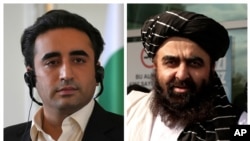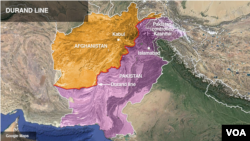Pakistan has decided to send its ambassador back to Afghanistan this week, more than four months after he was pulled out because of a failed attempt on his life in Kabul by the Islamic State group, multiple official sources told VOA Sunday.
The decision stemmed from an overnight telephone call between Pakistan Foreign Minister Bilawal Bhutto Zardari and Afghan Foreign Minister Amir Khan Muttaqi.
“The ambassador is due to arrive in Kabul before the Eid-ul-Fitar festival,” a Pakistani government official said, requesting anonymity because he was not authorized to interact with media.
The official refused to share more details, saying diplomatic movements require secrecy for security reasons. The three-day Eid festivities marking the end of the Muslim fasting month of Ramadan are expected to begin in Afghanistan this weekend.
Both sides have released brief statements confirming the Saturday contact between the two officials but neither mentioned the planned return of Pakistani Chargé d'affaires Ubaid-ur-Rehman Nizamanit to the Afghan capital.
Muttaqi discussed "a range of important bilateral political, economic, trade and transit issues" with the Pakistani counterpart, the Taliban-led Afghan foreign ministry said Sunday. "Both sides also agreed to improve diplomatic relations," the statement said without elaborating.
Zardari's office in Islamabad said that "issues of mutual interest" came under discussion between the two leaders but provided no further details. "The foreign minister reaffirmed Pakistan’s commitment to a stable, peaceful and prosperous Afghanistan,” the statement said.
Nizamani was on a routine walk inside the sprawling embassy compound in Kabul on December 2 when shooters opened fire on him from a nearby multistory building. He escaped unhurt, but his Pakistani security guard was hit in the legs by bullets. Pakistan immediately evacuated the chief diplomat and demanded the Taliban enhance the security of its embassy.
The Islamic State group, in a statement, claimed responsibility for the shooting, saying its regional affiliate, known as Islamic State Khorasan, assaulted "the apostate Pakistani ambassador and his guards."
The incident strained otherwise friendly ties between the Taliban administration and Pakistan.
Pakistan and landlocked Afghanistan share a nearly 2,600-kilometer border. Bilateral trade ties have increased since the Taliban reclaimed control of Afghanistan in August 2021 as the United States-led NATO troops withdrew after 20 years of the Afghan war.
Islamabad and the world at large do not formally recognize the Taliban government, citing human rights concerns, particularly restrictions placed on Afghan women's access to work and education.
The Taliban have banned female higher education and teenage girls are barred from attending schools beyond the sixth grade. They have banned Afghan women from working for the United Nations and nongovernmental aid organizations and ordered most women government employees to stay home.
Sunday's Taliban statement said Zardari assured Muttaqi that Pakistan, in the coming days, would release the remaining Afghan migrants jailed for not possessing valid travel documents. It gave no further details.
Pakistani authorities have, in recent months, released and repatriated more than 2,000 Afghan inmates, including women and children.
Nearly 300,000 people arrived in Pakistan after the Taliban takeover 20 months ago, fleeing worsening economic and humanitarian conditions in strife-torn, impoverished Afghanistan. Many left the country fearing Taliban reprisals for their association with U.S. and Western troops.
Pakistani officials estimate that only about 100,000 asylum seekers entered the country on valid visas. They have joined several million Afghans living in Pakistan as refugees and economic migrants after having fled decades of Afghan conflicts and poverty.
Several countries, including Pakistan, China, Russia, Turkey, and Iran, have kept their embassies in Kabul open after the Taliban seized power 20 months ago. But the United States and other Western nations moved their diplomatic missions out of Afghanistan to Qatar to help facilitate the delivery of humanitarian aid to the more than 28 million, two-thirds of the country’s population, in need of it.







